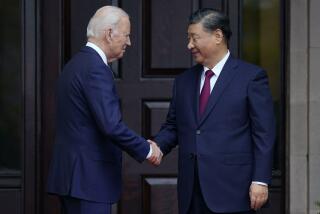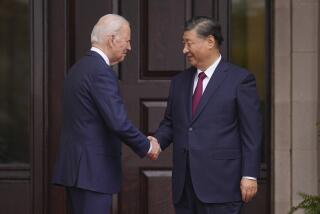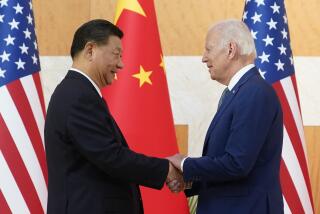Jiang’s U.S.-Built Plane Is Reportedly Bugged
- Share via
BEIJING — About a month before President Bush is to make his first state visit to China, reports have surfaced that the U.S.-made presidential plane for Chinese President Jiang Zemin has been found to be bugged with at least 20 listening devices.
The Financial Times and the Washington Post reported today that the newly outfitted Boeing 767 was planted with tiny bugging devices, including one bug embedded in the headboard of the presidential bed on board the aircraft, according to unidentified sources. The devices were sophisticated models that could be operated by satellite, the Financial Times reported.
The British newspaper said Jiang was apparently furious at the discovery, made after aircraft personnel heard a strange whining noise during test flights last September.
The Chinese Foreign Ministry had no immediate comment. A U.S. Embassy spokesman in Beijing also declined to comment.
However, the spokesman said that preparations for the president’s Feb. 21-22 visit to Beijing were still underway, including the arrival here today of a White House “pre-advance team” to do some initial scouting and setup for the summit.
Also, Bush came to China last October and was feted in Shanghai during a meeting of regional leaders even after the bugs aboard Jiang’s plane were reportedly found. Since the Sept. 11 terrorist attacks on the World Trade Center and the Pentagon, Beijing has been generally supportive of the American-led war on terrorism and regarded Bush’s upcoming visit as another step to solidify bilateral ties.
Still, the incident could prove embarrassing and adverse for Sino-U.S. relations.
The two nations’ last major contretemps also involved concerns over espionage. In April, a U.S. spy plane collided with a Chinese fighter jet off the southern Chinese coast and was forced to make an emergency landing on China’s Hainan island. The 24-member crew of the downed EP-3 reconnaissance plane was detained on the island for 11 days before being allowed to go home. Sino-U.S. relations plunged to their lowest level in two years.
Yet during that strained time, the Boeing 767 bought by the Chinese government for Jiang’s use was still being refitted in Texas. The airliner, originally destined for use by Delta Air Lines, was watched 24 hours a day by unarmed Chinese guards at San Antonio International Airport, according to a Sept. 29 report in the San Antonio Express-News.
The newspaper said that the plane was being outfitted as a luxury airliner able to accommodate up to 100 passengers, divided into different sections according to official rank.
Jiang, as president, had his own bedroom, bathroom with shower, 48-inch television and red carpet “fit for a king,” the newspaper said.
During the flap over the downed U.S. surveillance plane, the Chinese appeared worried that the U.S. would seize the aircraft in retaliation for the detention of the EP-3’s crew, but that did not happen, the newspaper said.
How and when the listening devices were installed remains unexplained because the plane was fenced off and under constant watch while in San Antonio. It was flown to China via Hawaii last August, the Texas newspaper said.
In its report today, the Financial Times quoted Chinese military officials as saying that 20 Chinese air force officers have been held for questioning about the bugging and could face arrest. Two officials with the Chinese company charged with importing the plane also are being questioned, the report said. An official investigation has been launched into potential negligence on the Chinese side.
Espionage has become an increasingly contentious issue between Washington and Beijing in recent years.
In addition to the diplomatic tussle over the EP-3, Sino-U.S. relations were dragged down by U.S. allegations that Wen Ho Lee, a scientist at Los Alamos, stole important nuclear secrets and passed them to China.
Beijing also officially discounts U.S. assertions that faulty intelligence led to the 1999 bombing of the Chinese Embassy in Belgrade, Yugoslavia, by North Atlantic Treaty Organization forces during the air war in Kosovo. Three Chinese were killed in the attack.
But there has also been increasing cooperation on the intelligence front where the two countries have found it helpful. Since Sept. 11, Beijing has offered to share intelligence with Washington in its war on terrorism.
Indeed, intelligence-gathering lies at the very root of Washington’s relationship with Communist China. In the early 1970s, before formal diplomatic ties were established, Beijing allowed the CIA to set up a listening post in China to monitor the Soviet Union.
More to Read
Sign up for Essential California
The most important California stories and recommendations in your inbox every morning.
You may occasionally receive promotional content from the Los Angeles Times.














